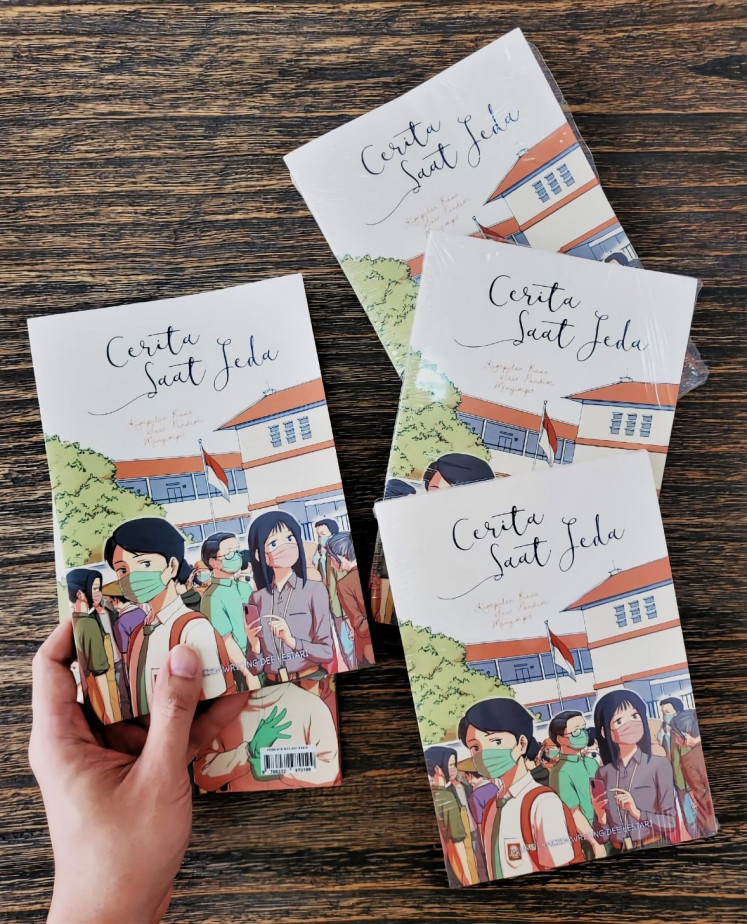Popular Reads
Top Results
Can't find what you're looking for?
View all search resultsPopular Reads
Top Results
Can't find what you're looking for?
View all search resultsChronicles from quarantine: Stories from self-isolation
Writers come together to tell their compelling tales of reflection on the pandemic.
Change text size
Gift Premium Articles
to Anyone
W
riter Gardini Eve reflects on the impacts the pandemic has had on her life and society as whole. Leticia Ong tells the story of the fictional Dimas, who looks upon his date with Keandra and the heartbreak that comes along with digitally mediated romance.
Stories by the two writers were published in Cerita Saat Jeda: Kumpulan Rasa Saat Pandemi Menjemput (Stories During the Pause: A Collection of Feelings at Time of Pandemic).
They were among the 27 writers and participants of renowned author Dewi “Dee” Lestari’s online kaizen writing workshop who got their stories published in the anthology.
“We know that Shakespeare wrote many of his works during the Black Death pandemic. Perhaps during that time he felt crazed because he could not go anywhere because he self-quarantined, and [we see the same thing happening] in the modern age,” said Dee, who took to Instagram to launch the book she curated.
The book came about after Dee shared her kaizen method of writing via online webinars and workshops. Derived from Japanese, the term translates to “small steps”, a mantra that has become the core of Dee’s writing process.
Drawing from Dee’s wealth of knowledge, her students, whom she has branded as semut merah (red ants), came together to submit their works in the hopes of being published with the project.
Out of around 800 submissions, and two and a half months of writing, editing and printing, 27 fictional and non-fictional stories were compiled in the book.
Mutiarini, one of the featured writers, said the book’s pandemic theme was not chosen because they cherished the catastrophe.
“I think this pandemic is forcing all of us to really look inside, [introspectively],” she said.
Multi-talented: Accomplished singer and writer Dewi “Dee” Lestari spearheaded a writing workshop that resulted in a book. (Courtesy of Dewi Lestari /-)Fashion designer Didiet Maulana finds that the book showcases the different perspectives of its 27 authors.
“In writing, we take something that is close to us and has a personal meaning and is easy for us to understand, and this theme of pandemic influences everything, whether it be the literary world or the art world […],” he said.
Didiet, who also heads the writing workshop’s alumni, explained they are referred as “red ants” for a reason: Throughout the classes, Dee made an analogy relating to red ants lining up on the wall.
“I believe that this analogy is fitting, because ants work together and are tireless, and this is how I see [our group]. We come from different backgrounds but have something in common, that is, a love of the literary world.”
Dee’s kaizen is a tried-and-tested method she has been using herself throughout the years.
The author is best known through her Supernova series, first published in 2001, stealing the public’s attention with her distinct storytelling style and method, through which she explored a variety of topics – from shamanism, ethnobotany (the study of the relationships that exist between people and plants) and entheogen (a substance consumed to bring on a spiritual experience), to crop circles and extraterrestrials.
The sixth and final installment of her Supernova series was published in 2016.
During her lessons, Dee highlighted the importance of courage and commitment to targets.
“Firstly, you need the bravery to start; writers require innate bravery,” she said. “Secondly, bravery to fail and thirdly, bravery to succeed. To [individuals] that are trying to be more creative, I advise that you do not fear trying. Don’t be afraid to then set a target for yourself because I believe that this is the true lesson.”
The kaizen method, true to its definition, also requires separating tasks into smaller, simpler chores, Dee said.
“[To overcome the burden of self-critique], as I said before, you have to have a target. But secondly, we have to separate when we write from when we edit. So, when we write, we have to keep on writing. Don’t think about editing yet. As soon as you are done, you should only then try to edit.”
Simultaneously, though her method allows the writer to showcase their talents to the best of their abilities, she reminded viewers that the concept of perfection does not truly exist.
“We have to realize that there is no perfect work of art, so we have to make peace with that fact,” said Dee, who is also a singer with the band RDS (Rita Sita Dewi).
With works from her first batch of workshop students being successfully published, Dee hinted at the possibility of starting another series of courses in November.
Reflecting on the mental hardships of self-isolation, Dee paid her respects to persevering creatives.
“I salute people who are producing art [during the pandemic]. Frankly, it isn’t easy.” (ste)
-- The writer is an intern at The Jakarta Post











